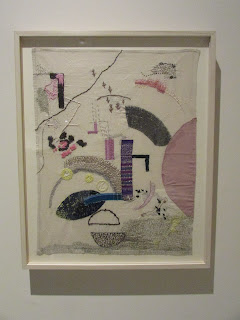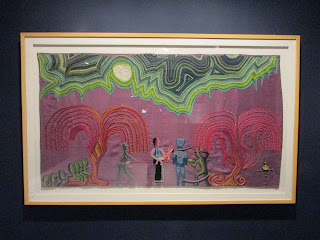Solange Pessoa - Hammock, 1999-2003
Another great exhibition in what is turning out to be an exceptional season for such in London this spring. Despite the seriousness of the title, this exhibition was very similar in its playful attitude to textiles to that of When Forms Come Alive at Hayward Gallery (here). Indeed certain pieces of the textile art on display here would easily fit into the sculptural remit of When Forms Come Alive at the Hayward. Part of my work involves stitch, albeit with paper rather than fabric, so I am always interested in how other artists use textiles techniques. Much of the work here was familiar as many of the artists or pieces exhibited have featured in recent shows across the capital over the last few years. Louise Bourgois at the Hayward (here), Sheila Hicks last year (here), Faith Ringold at the Serpentine (here), Magdalena Abakonowicz (here), Lenore Tawney (here) and of course Cecilia Vicuña's recent installation in the Turbine Hall at Tate Modern. The purpose of this exhibition is to show how powerfully textiles traditionally regarded as mere craft and womens work, can be created and used to subversive ends as a means of personal expression to encompass socio-political themes usually depicted by painters and sculptors in fine art. Fabric and thread in itself carry so many stories and meanings and the way in which these artists choose to use cloth to tell stories is so compelling. The cacti created by Margarita Cabrera in her piece - The Space In-between (Nopal), are created from the uniforms of US border patrol officers and sewn by immigrants in a country who they tried to deny access to. Other stories are quite harrowing such as Tracey Emin's quilt relating the story of her rape at the age of 13. Judy Chicago attempts to redress imbalances with a powerful, graphic, embroidered quilt depicting childbirth, a subject pertaining to women which she felt wasn't given sufficient voice or adequately presented historically in Western art. These and many stories are now addressed and given voice in this fascinating show. The curators appear to have been at pains to be as inclusive as possible in their choice of exhibitors selecting them from traditionally marginalised groups female, gay/queer and people of colour, and this selection certainly adds to the richness and diversity of the outcomes exhibited. The exhibition encompasses more or less all textile techniques including applique, beading, knitting, sewing or stitching, tapestry, embroidery, weaving, quilting. Stand outs for me were the section devoted to Igshaan Adams, a wonderful showcase in which to display the intricacies of his exquisitly ethereal, beadwork. Magdalena Abakanowicz, Mrinalini Mukherjee and Jagoda Buić are represented by large, muscular woven hangings which are always amazing to behold. New discoveries for me were the delicate sewn pictures made from human hair by Angela Su, and the lovely whimsical jacquard weavings of Mercedes Azpilicueta depicting women in historical costume caught in a particularly strong gale. Ironically given the remit of the exhibition to give a voice to the marginalised when I visited a couple of Gee's Bend textiles had sadly been removed by lenders due to the Barbican's decision to cancel a lecture by Pankaj Mishra titled "The Shoah after Gaza" about Israel's attacks on Palestine. Since then I believe that several more artists and lenders have requested that their artworks be removed due to the Barbican's censorship. Thankfully I visited the exhibition fairly early in its run and was able to see the majority of works before their removal. Hopefully this state of affairs will be rectified in the coming weeks before the exhibition ends its run. This situation is a real shame because the exhibition deserves to be enjoyed in its entirety, and opinions vocally and visually, especially in the form of these artworks need to be expressed freely.


Judy Chicago - Birth Tear/Tear, 1982
Tracey Emin - No Chance/(WHAT A YEAR), 1999
LJ Roberts - Jacqueline Mautner (Free CeCe), 2012
LJ Roberts - Rosza Daniel Lang/Levitsky at the New York City Dyke March, 2013
Sanford Biggers - Sweven, 2022
Sheila Hicks - Family Treasures, 1993
Pacita Abad - From Doro Wat to Sushi and Chicken Wings and Tings, 1991
Billie Zangewa - Angelina Rising, 2012
Billie Zangewa - Midnight Aura - 2012
Faith Ringold - Tar Beach 2, 1990-92
Igshaan Adams - Heideveld, 2021, Gebedswolke (Prayer Clouds), 2021-23, Paypackets still growing on the vines, 2022
Kimsooja - Bottari, 2018
T. Vinoja - Bunker and Border, 2021
Cian Dayrit - Valley of Dispossession, 2021
Cian Dayrit - Promised Land, 2018
Margarita Cabrera - The Space In-between (Nopal), 2016
Zamthingla Ruivah - Luingamla Kashan, 1990
Violeta Parra - Fresia and Caupolicán, 1964-65
Hannah Ryggen - Blood in the Grass, 1966
Angela Su - Sewing Together My Split Mind, 2019-20
Harmony Hammond - Bandaged Grid #9, 2020
Louise Bourgois - Arch of Hysteria, 2000
Diedrick Brackens - fire makes some dragons, 2020
Jeffrey Gibson - Speak To Me So That I Can Understand, 2018, We Play Endlessly, 2018, People Like Us, 2019,
Mercedes Azpilicueta - Ladies Dream or Stop Right There Gentlemen!, 2019
Antonia Jose Guzman and Iva Jankowicz - Messengers of the Sun, 2022
Kevin Beasley - Phasing (Flow), 2017
Tau Lewis - The Coral Reef Preservation Society, 2019
Yee I Lan - TIKAR/MEJA, 2018
Cecilia Vicuña - Quipu Austral, 2012
Lenore Tawney - Breath of Earth, 1964, The Megalithic Doorway, 1963, Secret Path, 1965, Path II, 1965-71
Mrinalini Mukherjee - Pakshi, 1985
Mrinalini Mukherjee - Vanshri, 1994
Mrinalini Mukherjee - Sri, 1982
Magdalena Abakanowicz - Vétement Noir, 1968
Jagoda Buić - Fallen Angel, 1967
Sarah Zapata - To Teach or Assume Authority, 2018-19
Acaye Kerunen - Ayelele, 2023
Solange Pessoa - Hammock, 1999-2003
Yto Barrada - Untitled (cosmos yellow), 2021 and Untitled (indigo grey), 2021
Antonio Pichillá Quiacain - Kukulcán, 2023
Cecilia Vicuña - Animata (Spirit House) for Salvador Allende, 1974-2023
Unravel: The Power and Politics of Textiles in Art
until 26th May
Barbican Centre
Silk Street
London
EC2Y


































































































No comments:
Post a Comment